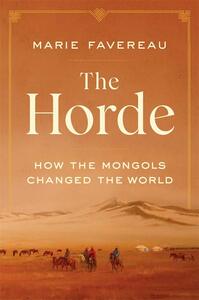MedievalReporter.com
Covering history's most marvelous millennium
Join our newsletter!

Covering history's most marvelous millennium
Covering history's most marvelous millennium
We review stuff for you, so you can pick the best medieval material.
Here’s our take on Marie Favereau’s The Horde.
First of all, to clear up any confusion regarding the book’s title and subtitle, The Horde firmly focuses on the western flank of the Mongol Empire and its “successor state” in that region: the Golden Horde. While Marie Favereau offers an excellent introduction to the wider Mongol history, there are books that deal better with the empire entire.

With regard to the Mongol West, The Horde captures the time period and geography as few history books do. If you’re looking to delve into the past of not just the Golden Horde, but also of the Persians, Cumans and Muscovites from the perspective of the steppe, this book should definitely be on your list. Favereau offers a fascinating insight into Genghis Khan’s conquests and the Mongol way of life that followed his horsemen trampling across Asia. Rather than speaking of a pax Mongolica, she dubs this the Mongol exchange – analogous to the globalizing effect of Columbus’ landing on the shores of America.
The first 100 or so pages of The Horde describe the Mongols’ rise to the temporary domination of most of Asia. Pages 100-200 (roughly speaking) outline how the western flank of the empire went its own way as the “Golden Horde”. This part thoroughly explains how the Horde was different, combining elements of Islam, Buddhism and Christianity with the worship of Tengri (the Mongol sky deity) and the political institutions which Genghis Khan left behind. The Golden Horde navigates this challenging yet rewarding landscape, whilst projecting power onto Europe and Africa by attacking the Hungarians and Poles and allying with Mamluk Egypt (against other Mongols!).
These continent-spanning relations are properly explained by Marie Favereau, with a clear and succinct style that’s refreshing to read. The author displays a willingness to be concise where possible, a tendency that not every historian can or wants to adhere to. In the final third of The Horde, this style – unfortunately – falls flat. Perhaps illustrative for the later period of the Golden Horde, riven with civil war and internal strife, the pages are now flooded with names of khans, begs, and envoys. For readers new to the subject, then, the narrative becomes quite hard to follow.
In The Horde‘s last chapter, Favereau heroically resurfaces with an overarching yet to-the-point conclusion. She shows how the Golden Horde for centuries remained the linking pin between Europe and Asia, facilitating and stimulating trade between parties as different as the Teutonic Knights, Lithuania and China. Furthermore, the Golden Horde courted both the Genoese and Venetians to construct trading posts in Crimea. For the golden khans, this came with boundless commercial opportunities. In an age when Europeans had not found the sea lanes to East Asia yet, the Horde was simply a crucially located empire and probably the key agent of the Mongol exchange.
For late medieval history with a global perspective, do read Favereau’s The Horde.

“Great”
Disclosure: these are affiliate links, meaning – at no additional cost to you – we will earn a small compensation if you click through. With these earnings, we can provide you with more exclusive medieval reports and guides.
Grab another book review from our collection.